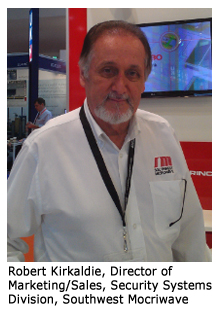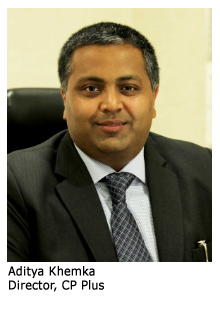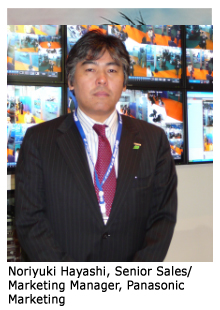In 2014, the Middel East will continue to recover for the following reasons. The U.A.E. sees a promising future because Dubai is hosting the 2020 World Expo. Saudi Arabia has lifted its restrictions on foreign workers and the government is continuing its investments in national infrastructure.
The Gulf Cooperation Council (GCC) countries — Bahrain, Kuwait, Oman, Qatar, Saudi Arabia, and the U.A.E. — still remain the region's top countries with the largest security markets. In 2012, the Middle East fell dramatically, “due to three unforeseen circumstances — the regional civil unrest, the fall in the price of oil and its production, and the fall in the US dollar,” according to IHS. The actual growth rate of video surveillance equipment in the Middle East fell to 5.3 percent. Although social turmoil and fluctuations in oil prices still made 2013 uncertain, the Middle East security market is predicted to bounce back to around 10 percent in 2013 and grow 12 percent in 2014. “The economy was a bit soft in 2012 and many customers delaying purchasing.
Implementation of many projects began in 2013, resulting in an excellent year for us,” said Watheq Abu Gharbiah, Regional Manager of Middle East at FLIR Systems. Most of all the suppliers expect the recovering momentum to continue through 2014 and 2015. Firstly, the U.S. began easing some of its economic restrictions against Iran this January, including its sanctions on cars and petrochemicals products. Secondly, recovery of the Iranian market would also raise the region's average growth rate. The latest cheerful announcement is of Dubai winning the bid to host the 2020 World Expo. The BBC reported that authorities in Dubai forecasted the 6-month event to bring in around US$23 billion and cost the country around a total $8.4 billion, of which around $6.5 billion is expected to be government spending on infrastructure projects. Finally, the 2022 FIFA World Cup in Qatar is also serving as a major driver to boost the overall economy in the region.
CRITICAL INFRASTRUCTURE PROTECTION
To support the active economic activities in this region, protection of critical infrastructure ranging from airports, seaports, oil and gas, public utilities, highways, railways, metros, and etc., is important. Critical infrastructure protection remains as the most crucial market sector in the Middle East.

The oil and gas sector requires refinery protection and is the largest market sector here. The scale of projects in this sector is also much larger than other market sectors. Aside from the GCC countries, Iraq, Pakistan, and the Northern African countries, also have great potential. Robert Kirkaldie, Director of Marketing/Sales for Security Systems Division at Southwest Microwave, which designs and manufactures integrated, electronic perimeter security systems, especially for the oil and gas sector, in this region said, “In a country like Saudi Arabia, we mostly deal with perimeter projects of 3,000 to 5,000 meters. The biggest complex in oil and gas, which comprises of a storage tank, pipe lines, transportation, and all other facilities, can have a perimeter of up to around 20 kilometers. Thus, the size of a refinery is much bigger than a prison or power plant.”
Another fast developing market sector is airports. Cities in the Middle East compete to build the biggest and most modern airports to attract tourists. Abu Dhabi is planning its new $3 billion international airport terminal, while Doha, Qatar is near completion with its new airport. “Dubai has the largest airport here. The old one, which traffics 150 million passengers annually has 3,500 CCTV cameras. The latest one has around 5,000 cameras. Elsewhere in the region, the latest airport in Doha will begin operations this year; Saudi Arabia has 15 new airports; and Kuwait International Airport also has plans to expand,” said Gharbiah.
The Middle East is a project-oriented market. “Because it is so diverse, each country does have their particular preference toward products and partners. I think this unique characteristic brings a good opportunity for CP Plus to build up our own distribution business here. This year, we are going to set up five or six branch offices in some countries in the Middle East,” said Aditya Khemka, Director of CP Plus.
SAUDI ARABIA IS BOOMING FAST
Amongst the GCC countries, Saudi Arabia is gradually catching up with the U.A.E. in terms of security market demand and growth potential. Saudi Arabia has the highest number of large government projects, making it very important in this region. Peter Biltsted, Director of MEA at Milestone Systems said, “Milestone will be more directly engaged in Saudi Arabia this year. This means we will put our feet on the ground in the country, whereas Milestone channel partners used to be in charge previously. We have a very good foothold in Saudi Arabia now, since we have done several large projects. Moving forward, we would like to leverage our past experience to strengthen our business foundation here.”
In the past two years, Saudi Arabia heavily restricted the number of foreign workers to secure the employment of local workers. In 2014, the restrictions are expected to be lifted in order to continually push the market to grow. “Saudi Arabia just started their new financial year and the government has announced plans to build six new cities. It also made a US$200 million investment in aviation toward the building of new innovative airports. We can also expect several new cities in Saudi in the near future,” continued Tarek Ismail, Sales Director of Middle East at Tyco Security Products.
.jpg)
Large-Scale Government Projects Everywhere
In terms of an average project size, it is not really possible to compare projects in other GCC countries with those in Saudi Arabia. In Saudi, one city is just like a country in others. John Davies, MD at TDSi also echoed, "In Saudi Arabia, the projects are much bigger. Last year, we supplied systems to several large government projects across the Kingdom. Saudi Arabia is a very large country and represents more than 25 percent of the GCC GDP.
When you do a project for an institute in Saudi Arabia, it includes offices that are located all over the country. In contrast, institutes in the U.A.E. usually have only one or two offices." Ismail continued, “Our company has been here for more than 20 years. In Saudi Arabia, for example, we have the largest bank in the whole region as one of our customers. It is a national bank with 400 branches and 2,000 ATMs in the country. The number of buildings for VIP service, VIP accounts, and money transfer, is over 200. More than 1,300 recorders and 8,000 cameras  from mixed brands were used in that project. From a banking point of view, a project this size covers the entire banking sector in the GCC countries. In Qatar, for example, the largest capital bank has a maximum of only 50 to 60 branches.”
from mixed brands were used in that project. From a banking point of view, a project this size covers the entire banking sector in the GCC countries. In Qatar, for example, the largest capital bank has a maximum of only 50 to 60 branches.”
Religious Buildings, Universities, and Banks
Saudi Arabia, being home to the largest and most holy Muslim mosques, has many religious projects. “It has many religious buildings, such as mosques and related infrastructures, where you can see thousands and thousands of cameras installed. Bosch Security Systems has done many projects in holy places in this country too,” said Hakan ?zyi?it, Regional Director of Middle East at Bosch Security Systems. “Bosch is also involved in many prestigious projects in the Saudi Arabian education sector. The country has the largest population in the region and almost half of the Saudi Arabian population is aged below 30. Hence, its government is focused on education and plans to build more universities and facilities to ensure its a much more competitive Saudi workforce in the future.”
Also, due to the country's conservative nature and religious background, the government has strict laws toward gender segregation in many public places, such as restaurants and shopping malls. Therefore, a public place usually tends to have more cameras installed for security and monitoring, compared to other countries. For .jpg) example, in Saudi Arabia, it is pretty normal to have around 1,000 cameras for a five-star hotel, while only around 100 to 200 cameras are installed in a five-star hotel in the U.A.E., according to an industry expert in this region.
example, in Saudi Arabia, it is pretty normal to have around 1,000 cameras for a five-star hotel, while only around 100 to 200 cameras are installed in a five-star hotel in the U.A.E., according to an industry expert in this region.
Considerations for Doing Business
Even though there are plenty of opportunities here, business is conducted very differently in the U.A.E. “The Saudi Arabian government sometimes has strong concerns about the origin of the products for certain projects to avoid products that are made in China,” said Noriyuki Hayashi, Senior Sales/Marketing Manager of System Solutions Department, MEA at Panasonic Marketing. Meanwhile, due to the sheer volume of government projects here, decision making usually takes a little while. Aditya Sahaya, Director of Business Development for Prologix Distribution also pointed out, "Traditionally, the U.A.E. is a very mature market, when it comes to CCTV and surveillance, and the end customers and consultants have very specific requirements which need to be adhered to. Saudi Arabia seems to be going down the same path. Despite a longer sales cycle, the country has been growing as the single largest market in the region."
* Let's take a further look into other areas in Middle East shines in 2014 (2): U.A.E., Oman, Iran, Iraq, Pakistan, Lebanon, Jordan